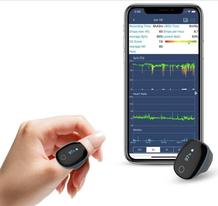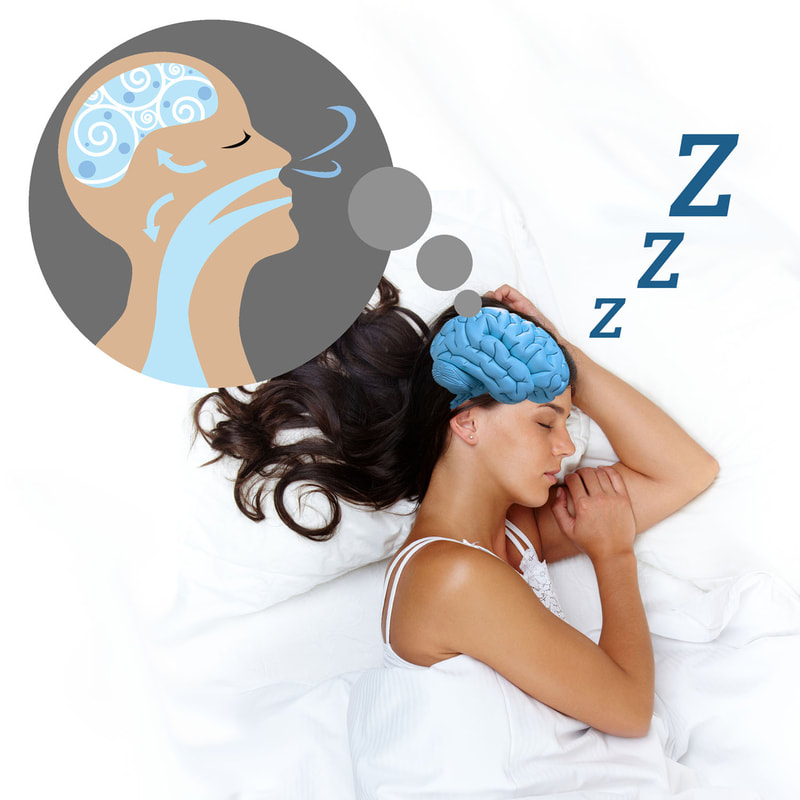The body needs a certain level of oxygen in the blood or it simply will not function as efficiently. SpO2 or oxygen saturation is a measurement of the amount of oxygen-carrying hemoglobin in the blood relative to the amount of hemoglobin not carrying oxygen. Ideally, SpO2 (blood oxygen saturation levels) of a healthy person should be between 94% and 100%. When we are afflicted by ongoing sleep disruption, this in turn affects our oxygenation levels and can subsequently put our brain health at risk. Things that interfere with a good night’s rest. Obstructive sleep apnea (OSA), a potentially serious disorder where breathing repeatedly stops and starts can if left untreated lead to other conditions such as high blood pressure, heart disease and diabetes. But OSA can negatively impact our brain function too, with the potential to cause cognitive impairment and strokes. Sleep Apnea, along with excessive dynamic airway collapse, snoring and sleep disordered breathing affect almost 20% of the population or more than 936 million people worldwide and may be even more of a problem as we age. So as with all health issues, getting on top of any sleep problems at the earliest opportunity is always advised. How does sleep apnea cause memory loss? People with OSA can experience a range of daytime mental symptoms primarily from a lack of restorative sleep due to waking up multiple times throughout the night. You may not always be aware of the constant wakefulness so ask yourself if:
This last symptom in particular is a big red flag to talk to your doctor as we know that sleep apnea interferes with our ability to convert short-term memories into long-term ones. Research based on the connection between depression and memory has found that people with untreated OSA have difficulty recalling specific details about their lives and it “may impair the brain's capacity to either encode or consolidate certain types of life memories, which makes it hard for people to recall details from the past.”1 Consolidating memories to access later is a vital link in the memory-creating process that occurs during sleep. But when sleep is disrupted, people have trouble incorporating and categorizing their experiences, which leads to impaired memory formation and forgetfulness. Research conducted at University of California Los Angeles found that people with sleep apnea show significant changes in the levels of two important brain chemicals, glutamate and gamma-aminobutyric acid (GABA). Affected individuals seemed to have decreased levels of GABA that acts as an inhibitor and supports mood and unusually high levels of glutamate, which as an excitatory neurotransmitter can in excess cause our brain to have to work in a state of stress.2 As a result, our neurological wellness can be seriously challenged especially if the situation is unabated. Additionally, there have been multiple studies in subjects with OSA that have evidenced a decrease in both gray and white matter, contributing to memory loss, cognitive and executive dysfunction and other neurological impairments. 3, 4 Know your oxygen level!  One of the many excellent devices available and that we recommend includes the O2 Ring, a continuous ring, medical grade oxygen monitor that vibrates silently (so you don’t wake your partner) when low oxygen levels or abnormal heart rates are detected. The data is automatically downloaded to the app on your phone and allows for accurate tracking every second of your Sp02 levels and heart rate as well as body movements. By recording this valuable information to share with your physician, you can be far more informed about a known or as yet identified sleep disorder for additional assessment and treatment. Learn more at https://getwellue.com/pages/o2ring-oxygen-monitor Healthy sleep hygiene starts with a healthy lifestyle.  You can’t spend your day sitting at a desk or on the sofa, eating processed food, not exercising or doing anything to relieve stress and expect to just pop into bed at 10 pm and immediately have a good night’s rest. Obesity, sedentary lifestyles, poor diet and unresolved emotional trauma or mental health issues can all add up to not only a lack of sleep (less than 7 to 8 hours) but also create or compound a sleep disorder that ultimately challenges your brain’s health. Take a look at our blog for more ways to sleep well – and breathe easier – and be sure to talk to your doctor or sleep specialist to thoroughly investigate any issues you may be experiencing to get started on appropriate treatment. Sweet dreams, Dr. Suzanne Gazda References: 1 RMIT University. "Sleep apnea creates gaps in life memories: People with sleep apnea struggle to remember details of memories from their own lives, putting them at risk of depression." ScienceDaily. ScienceDaily, 31 January 2019. https://www.sciencedaily.com/releases/2019/01/190131101103.htm 2 Macey, P.M., Sarma, M.K., Nagarajan, R., Aysola, R., Siegel, J.M., Harper, R.M. and Thomas, M.A. (2016), Obstructive sleep apnea is associated with low GABA and high glutamate in the insular cortex. J Sleep Res, 25: 390-394. https://doi.org/10.1111/jsr.12392 3 Castronovo V, Scifo P, Castellano A, et al. White matter integrity in obstructive sleep apnea before and after treatment. Sleep. 2014;37(9):1465-1475. Published 2014 Sep 1. doi:10.5665/sleep.3994 4 Joo EY, Tae WS, Lee MJ, et al. Reduced brain gray matter concentration in patients with obstructive sleep apnea syndrome. Sleep. 2010;33(2):235-241. doi:10.1093/sleep/33.2.235
0 Comments
Your comment will be posted after it is approved.
Leave a Reply. |
AuthorDr. Suzanne Gazda, Integrative Neurology Archives
February 2024
Categories |

 RSS Feed
RSS Feed